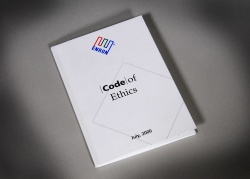- This page was last modified on 18 February 2020, at 13:05.
- This page has been accessed 2,924 times.
- Content is available under the Creative Commons Attribution Share Alike License unless otherwise noted.
| “ | Ethics is knowing the difference between what you have a right to do and what is right to do. | ” |
| —Potter Stewart | ||
Read Section 14.6: Speaking ethically and avoiding fallacies, in Saylor Academy (Ed.) 2012. Business Communication for Success. (See page(s) 563 - 567 in PDF version.)
This reading looks at why ethics are important in the persuasive process and what behaviours must be avoided to enable you to build credibility and trust with audiences. It also offers a simple 5-step presentation checklist that will help you focus on the key positive elements of a persuasive argument.
Find one example of a persuasive advertising message, website, or video that you think uses unethical techniques, and one example that you think uses an effective, ethical strategy to influence people.
What techniques are being used in these examples? What makes them ethical or unethical? In your view, more generally, what is it that makes some marketing messages ethical and others unethical? Please share your response in the Discussion forum without identifying any advertisers by name.
